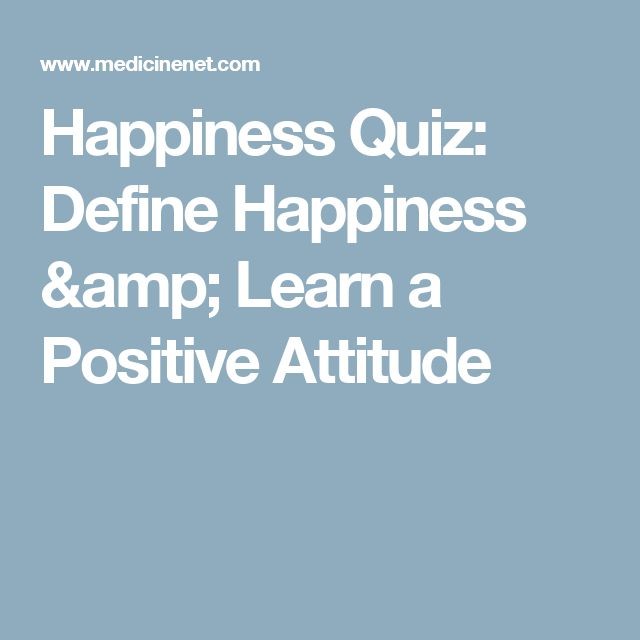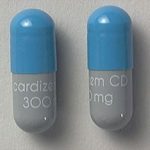
Contents
- 1 Happiness Quiz: Positive Attitude
- 1.1 Negative emotions are more powerful than positive emotions.
- 1.2 Which pair of chemicals is NOT used by the body to feel good?
- 1.3 From a 2013 study of happiness, which country ranks #1 in life satisfaction?
- 1.4 In general, happy people do NOT:
- 1.5 People are not hardwired to be naturally happy.
- 1.6 Where do the happiest people in the United States live?
- 1.7 You are less likely to be unhappy if you live in California.
- 1.8 At what age are people happiest?
- 1.9 What makes people happier?
- 1.10 What is the mesolimbic system?
- 1.11 Which method promotes physical and emotional healing and wellness?
- 1.12 Suppression of sadness is not the key to long-term happiness.
- 1.13 What is better to improve one’s own sense of happiness?
- 1.14 "Hedonophobia," "hedonism," and "hedonist" are terms rooted in the Greek word for:
- 1.15 What do laughter and comedy do for the human body?
Happiness Quiz: Positive Attitude
Negative emotions are more powerful than positive emotions.
While some research supports that negative emotions can outweigh positive emotions at times, that is contradicted by studies. Positive memories, even about negative events, tend to be stronger over time. Positive feelings are stronger in the mornings compared to evenings and increase with age.
True False
Which pair of chemicals is NOT used by the body to feel good?
Endorphins, the body’s own opiate, are released during exercise and help elevate mood and decrease pain. Tryptophan contributes to relaxation and sleep and is found in food sources. Serotonin and dopamine activity are deficient in depressed individuals and are replaced by antidepressant medications. Oxytocin is released during sexual intercourse or breastfeeding. Vasopressin counteracts stress.
Cortisol and prolactin Oxytocin and vasopressin
From a 2013 study of happiness, which country ranks #1 in life satisfaction?
Denmark was ranked first in overall life satisfaction of its citizens while the United States ranked 17th. Denmark ranks 16th in household income while the United States ranks first.
America Denmark Switzerland Canada
In general, happy people do NOT:
In the United States, happiness is less connected to income and more to gratitude, joy, forgiveness, kindness, a good night’s sleep, regular exercise, sexual activity, positive thinking, and self-actualization.
Express gratitude, forgiveness, and kindness Get regular exercise, sexual activity, and good sleep Have higher incomes or higher intellect Savor joy and practice optimism
People are not hardwired to be naturally happy.
Happiness is the result of a combination of biological, psychological, and social factors. It is a combination of nature and nurture.
True False
Where do the happiest people in the United States live?
Research indicates that 6 of the top 10 ranked states for happiness are in the southern United States. This may be due to less congestion and lower living costs.
Northeastern region Southern region West Coast Middle America
You are less likely to be unhappy if you live in California.
Despite the temperate weather California is famous for, congestion and the high cost of living contribute to its lower happiness ranking.
True False
At what age are people happiest?
As we age, we become happier. Older adults experience fewer negative emotions such as anger and more calm and relaxation.
17-21 29-35 40-46 50+
What makes people happier?
Frequent satisfying sexual activity is associated with marital and personal happiness. Wealth is not necessarily associated with satisfaction or well-being.
What is the mesolimbic system?
The mesolimbic system produces excitement, anticipation, and feelings of joy.
Which method promotes physical and emotional healing and wellness?
Music therapy uses music for healing and promotes health and well-being in people with various conditions.
Suppression of sadness is not the key to long-term happiness.
Acknowledging and discussing problems with loved ones is important for long-term happiness.
True False
What is better to improve one’s own sense of happiness?
Gratitude, appreciating what one has, is a key part of feeling happy. Keeping a journal of things you appreciate about your life can help you get in touch with your happiness.
Pleasure Gratitude
"Hedonophobia," "hedonism," and "hedonist" are terms rooted in the Greek word for:
The words hedonism, hedonophobia, and hedonist come from "hedone," the Greek word for pleasure.
Pleasure Pain Companionship Hardship
What do laughter and comedy do for the human body?
Laughter and humor have a number of health benefits. They decrease pain, stress, blood pressure, and heart rate. They also improve blood circulation, decrease stress hormones, and boost the body’s immune response.
Boosts blood flow and immunity Decreases the body’s ability to absorb alcohol Triggers hunger All of the above
Images provided by:
1. iStockPhoto
2. iStockPhoto
3. iStockPhoto
4.1 iStockPhoto
4.2 iStockPhoto
4.3 iStockPhoto
4.4 iStockPhoto
5. iStockPhoto
6. iStockPhoto
7. iStockPhoto
8. iStockPhoto
9.1 iStockPhoto
9.2 iStockPhoto
10. iStockPhoto
11. iStockPhoto
12. iStockPhoto
13.1 iStockPhoto
13.2 iStockPhoto
14.1 iStockPhoto
14.2 iStockPhoto
14.3 iStockPhoto
14.4 iStockPhoto
15. iStockPhoto
Kleef GA. Understanding the positive and negative effects of emotional expressions in organizations: EASI does it. Human Relations 2014 February.
Ritchie TD, Batteson TJ, Bohn A, Crawford MT, et al. A pancultural perspective on the fading affect bias in autobiographical memory. Memory, 2014.
Coverdill AJ, McCarthy M, Bridges RS, Nephew BC. Effects of Chronic Central Arginine Vasopressin (AVP) on Maternal Behavior in Chronically Stressed Rat Dams. Brain Science 2012; 2(4): 589-604.
Huron D. Why is sad music pleasurable? A possible role for prolactin. Musicae Scientiae 2011 July; 15(2): 146-158.
Helliwel J, Layard R, Sachs J, eds. World Happiness Report 3013.
Handley M. Americans are the wealthiest but not the happiest. U.S. News and World Report 2012 May.
Dietrich A, McDaniel WF. Endocannabinoids and exercise. British Journal of Sports Medicine 2004; 38: 536-541.
Barker E. 10 steps to a happier life. The Week 2014 January.
Ross N. Health, happiness, and higher levels of social organization. Journal of Epidemiology and Community Health 2005; 59: 614.
Oswald AJ, Wu S. Objective Confirmation of Subjective Measures of Human Well-Being: Evidence from the U.S.A. Science 2009.
English T and Carstensen LL. Emotional experience in the mornings and the evenings: consideration of age differences in specific emotions by time of day. Frontiers in Psychology 2014; 5:185.
Holland NN. Literature and Happiness. PSYART: Journal for the Psychological Study of the Arts. 2009 December; http://www.psyartjournal.com/article/show/n_.
Eells K. The use of music and singing to help manage anxiety in older adults. Mental Health Practice 2014; 17 (5): 10.
Barker E. 10 steps to a happier life. The Week 2014 January.
Parker CB. The pursuit of happiness. University of California Davis Magazine 2011 Spring; 28(3).
Collins English Dictionary – Complete & Unabridged 10th Edition 2009; William Collins Sons & Co. Ltd., New York.
This tool does not provide medical advice. See additional information:
THIS TOOL DOES NOT PROVIDE MEDICAL ADVICE. It is intended for general informational purposes only and does not address individual circumstances. It is not a substitute for professional medical advice, diagnosis or treatment and should not be relied on to make decisions about your health. Never ignore professional medical advice in seeking treatment because of something you have read on the MedicineNet Site. If you think you may have a medical emergency, immediately call your doctor or dial 911.
© 1996-2024 MedicineNet, Inc. All rights reserved.
© 1996-2024 MedicineNet, Inc. All rights reserved.


